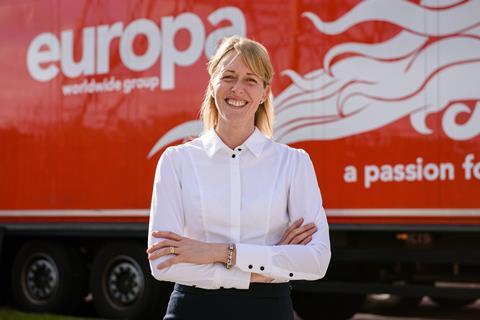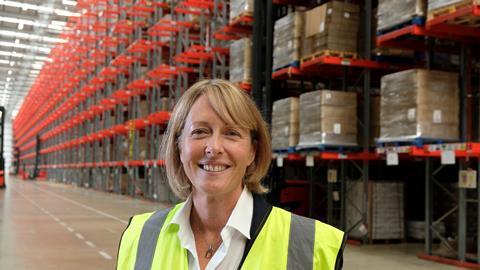Dionne Redpath, chief operating officer at Europa Worldwide Group, tells MT how shrewd investments in sales and IT are keeping the business on track for further growth
How’s business looking in such a challenging market?
Last year was very, very difficult. Times are really tough. We took 2023 as a year of consolidation off the back of a successful 2022 and piled into investment across each of the three divisions. In 2022 we made a £15m net profit which gave us a real opportunity to press ahead. We’ve made significant investments with the Europa Road division after the success of Europa Flow, which was our Brexit-busting customer solution.
How much has the market slipped?
From a road perspective, something like 15% overall. And in the unaccompanied marketplace we’ve seen a major drop of around 20-25%. We’re tracking at just above the prior year figures. So although there are still some headwinds to come we’re in pretty good shape. This year we expect to see the payback from the investments starting to come through. We’ve had an overarching growth strategy from the beginning to double in size every four to five years, and so far that’s exactly what we’ve achieved.
We have this concept called leaky bucket. We don’t want a leaky bucket inside our business. We want to show customers we’re doing a really good job and the pricing is right and that what we’re delivering is of value.
Any other investments during last year?
Yes, we’ve invested in 18 new road sales managers across the UK and 60 new account managers. Some of those sales branch managers are in the customer service side of our business, some are in the pure growth side. We’ve also launched new Dublin and Rotterdam hubs.
How much of a success has Europa Flow been?
It’s really delivered up transit times to and from Europe. We also created a money back guarantee (MBG) product at the beginning of 2023 and had quite a lot of success with that. It applies to our export shipments coming out of the UK into Europe and it’s growing substantially which is brilliant. Approximately 10% of our exports are moving on the MBG server.
So there’s room for optimism this year?
There are plenty of things to be optimistic about. We’re creating our own opportunity via the investments that we’re making and by focusing on making sure we have the right sales presence and competitively priced products that resonate with the market. But the overarching marketplace is in decline. It’s going to have an impact on our 2023 profitability because we’ve invested an extra £5m in software development. We went into the year with a team of 18 software developers, we now have about 70. But ultimately that’s really important to us because practically all of the answers lie in IT. Look at Europa Flow. It is a very light touch from a people perspective, for a very, very intense customs process. So our system connecting through to Eurotunnel, for example - connecting into French customers, connecting into UK customers, connecting into our customers’ environments, so we don’t have to employ hundreds of people to perform that same task.
What’s your advice to SMEs who may be struggling to stay afloat?
It’s very, very simple for all of us. Look after your costs without sacrificing service. It breaks my heart to see, every other day, another operator falling into difficulties and going into administration. Make sure that you are listening to what your customers want because some are frankly very demanding and they might not want the accompanying price tag. But keep things lean and make sure that you are delivering value into your customer base.
And don’t stand still, which is one of the most damaging things that you can do because the whole world just moves without you and you get left behind. Then you’re on the back foot and you’ve got to play catch up and that’s when decision making can go awry.
Are you cutting down on sub-contractors?
There would be nothing for us to be gained by bringing some of that function in house. We operate our own artic fleet up and down the country but we partner with a significant number of UK domestic operators who are fully contracted and tied in. It’s not just some kind of transactional thing. They are absolutely wholeheartedly embedded into the process in every way and we’ve got no desire to change that.
Europa Worldwide CEO Andrew Baxter was a strong supporter of Brexit. How do you feel things have ultimately played out there?
That event was singularly the most-high profile and significant event that’s happened to our business in its entire history. We invested millions and millions into the development of Europa Flow, creating a customs infrastructure from the ground up. Our entire team worked eight to 20 hours a day in those first six to 12 weeks in 2021.
There were plenty of naysayers in the market but now many if not all of our competitors have also launched their own variation of Europa Flow. We saw it as an opportunity to preserve trading conditions as if Brexit had never happened. Many of our customers really relished that opportunity and a large proportion have now taken advantage of the MBG sitting on the back of it.
What’s the more general industry feeling on Brexit now?
I think it’s more about the post-Covid landscape and how it created this real bubble of optimism that’s subsequently diminished. Then there’s the high inflation, the cost of living crisis, the Suez Canal issue of old, which has created this very unique set of circumstances.
Where we sit right now is where we need to look out from, rather than looking out from 2020 or 2021. This is the new ground zero and businesses are looking to build out from this point forward, I suspect.
Who are your main competitors?
Dachser and Kuehne+Nagel are our two single biggest competitors, but the innovations that we’ve made since Brexit with Europa Flow and the MBG have really allowed us to build a significant market share.
What do you make of Ceva buying Wincanton?
That could be very good for businesses like Europa. It’s a consolidated move that actually removes the layer of choice. That makes it more challenging from a customer perspective which is a great opportunity for businesses like Europa because we can kind of come into the void. We don’t have 50 warehouses but we have got the financial wherewithal, the size and scale to allow us to invest in more buildings.
Any acquisition plans of your own?
Our core strategy is focused around organic growth. By the time you try to bring your own imprint to the business that you’re buying, and wrapped in your customers and incorporated that business, or melded the two businesses together, what are you really left with? It’s always quite an arduous journey. It costs a lot of money. It takes a heck of a lot of time. And actually, we work with a team of people that allow us to expand into new territories and into new products, all of that good stuff. That gives us as good as, if not better, chance of achieving our growth targets
How far down the net zero journey are you?
We did a very specific trial last year with Vertellus and had a very, very positive experience but ultimately it’s not particularly viable for the type of transport that we’re providing, not least because the road infrastructure from a recharging perspective is not really where it needs to be. And our customers don’t particularly want to pay the additional price tag, although that might change.
If we could do it economically at a price point that customers would pay for and we could maximise our network capability in that way we would. But until there is an infrastructure there will not be any point for companies like us to get heavily involved.
We have aspirations to do more with final-mile distribution. But even there the weight of consignments comes with a challenge because you get reduced payloads.
If customers want to pay for it, I could quite feasibly see an opportunity for final-mile distribution to flagship stores in London, for example, using electric vehicles. That is something that I think in the short term can give us an opportunity, or rather give that opportunity to customers. So we’re trying to carefully pick our way through it based on what the infrastructure permits and the technology available.
Is there a frustration that customers aren’t willing to pay?
We all live in the real world. We operate in a very, very cost conscious environment. So I understand why customers might want all the things that they want, but they don’t want the accompanying price tag. They’re trying to balance it against their own economic challenges.
So you predict only a very slow move towards zero emission vehicles for most HGV operators?
It’s always hundreds and hundreds of baby steps. Then over a course of time you’ll look back over your shoulder and you realise just how much progress you’ve made. Because once the infrastructure is there, then it will become much more accessible, that the demand will come. Then, once the demand comes, the prices will start to fall in line.
Will it come down to commercial partnerships?
Yes, we have all got to get behind it. That’s industry, it’s government, it’s infrastructure providers. It’s got to come in with sound economics because otherwise it most certainly won’t be viable. But there’s a looming deadline and we have got to do something about it. Moreover, we want to do something about it. So give us a product that delivers on its credentials and comes in with a good price. Then make sure that we can run kit effectively, up and down the country. And there’s a lot of work to be done there. The government can’t singularly do it by themselves either. Everybody has got to work together to solve this problem.















